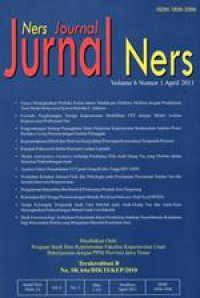
Jurnal
Family Process with Breast Cancer Patient in Indonesia
Introduction: Breast cancer occupies the first position in Asia’s women cancer cases in recent years. Signs and symptoms experienced by the patient affect the stress condition of the patient as well as the family as a caregiver. The condition changes to deal with problems during patient assistance as a major problem in an outpatient setting. The demands of adaptation to through the needs during the period of assistance by the family is more complex. The study aimed to determine the experience of stress and adaptation of breast cancer patient’s family. Methods: The qualitative method used with in-depth interviews on seven respondents who were the family caregiver of breast cancer patients. Setting carried out at the shelter house in Bandung. The analysis process used thematic analysis based on Braun & Clarke. Results: The results found five main themes are: 1) Stressor on breast cancer patients, 2) Crisis fulfillment of companion needs, 3) Crisis accompaniment, 4) Coping mechanisms of caregiver, and 5) Ability in adaptation. Conclusions: Family experience in assisting breast cancer patients who undergo outpatient also impact families tension who traversed with a subjective effort optimally to adapt in accompanying patients and the needs of other resource support system. Suggestions for future step are early recognition of stress by health workers especially nurses to be able to provide targeted interventions to develop positive adaptation to clients. The development through research is needed in applying family center care both the outpatient and inpatient care in an integrated manner.
Availability
No copy data
Detail Information
- Series Title
-
Jurnal Ners, Vol. 12 No. 2 Oktober 2017
- Call Number
-
(05) 610.5 PRO j
- Publisher
- Surabaya : Prodi Ilmu Keperawatan FK Unair., 2017
- Collation
-
Hlm. 180-188
- Language
-
English
- ISBN/ISSN
-
1858-3598
- Classification
-
(05) 610.5 PRO j
- Content Type
-
-
- Media Type
-
-
- Carrier Type
-
-
- Edition
-
-
- Subject(s)
- Specific Detail Info
-
-
- Statement of Responsibility
-
-
Other version/related
No other version available
File Attachment
Comments
You must be logged in to post a comment
 Computer Science, Information & General Works
Computer Science, Information & General Works  Philosophy & Psychology
Philosophy & Psychology  Religion
Religion  Social Sciences
Social Sciences  Language
Language  Pure Science
Pure Science  Applied Sciences
Applied Sciences  Art & Recreation
Art & Recreation  Literature
Literature  History & Geography
History & Geography